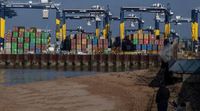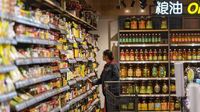On April 13, 2025, Britain announced a significant boost to its financial support for exporters, allocating an additional £20 billion (approximately $26 billion) to assist firms grappling with the impact of U.S. tariffs. This move comes amid increasing uncertainty surrounding global trade rules, particularly as tariffs imposed by former President Donald Trump have created challenges for UK businesses.
The new funding will enhance the capabilities of UK Export Finance (UKEF), raising its lending capacity to £80 billion. Of this total, up to £10 billion is earmarked specifically to support businesses most affected by the tariffs in the short term. Chancellor Rachel Reeves emphasized the importance of this initiative, stating, "The world is changing, which is why it is more important than ever to back our world-leading businesses and support them to navigate the challenges ahead."
British exporters contribute significantly to the economy, with goods exports valued at £364 billion annually and services worth an impressive £511 billion. The United States remains the UK's largest market for goods, accounting for £59 billion in exports, with automobiles being the top product sold, generating £8.3 billion in sales over the past year.
However, the landscape has shifted dramatically due to Trump’s tariffs, which include a 10% levy on most British goods and 25% on cars, steel, and aluminum products. Business and Trade Secretary Jonathan Reynolds remarked, "Our message to British business is clear – we’ve got your back. This package, backed by the British Business Bank and UK Export Finance, will be a crucial shot in the arm to exporters and small firms looking to trade around the world."
In tandem with the financial boost, the British Business Bank is expanding its Growth Guarantee Scheme by £500 million. This scheme provides a 70% government-backed guarantee against loans, enabling lenders to support smaller businesses that may struggle to secure financing through traditional means.
Across the globe, businesses are feeling the effects of these tariffs. In Taiwan, manufacturers are bracing for the repercussions of the U.S. trade policies. Alex Tang, general manager of Aegis CNC, shared his concerns, stating that the uncertainty surrounding tariffs is a burden for many. Although Taiwan currently faces a 10% tariff on many of its products, this is a far cry from the 32% that had been threatened by Trump.
"It’s the butterfly effect," Tang explained, highlighting that the impact of tariffs extends beyond those directly exporting to the U.S. Many Taiwanese manufacturers, though not exporting directly to the U.S., supply components to factories that do. He noted, "Some U.S. traders that buy from Taiwan have put orders on hold while they try to figure out what might happen."
The situation is further complicated by the fact that China, Taiwan's major competitor, has faced even steeper tariffs of 145%. This could lead to increased competition for Taiwanese manufacturers as Chinese exporters seek new markets outside the U.S.
During a recent visit to Taichung, Taiwan's President Lai Ching-te met with local manufacturers to discuss the tariffs' impact. Many of these businesses are small and medium-sized enterprises (SMEs) that contribute significantly to Taiwan's economy. According to government statistics, these firms account for 12% of the island’s manufactured exports.
Despite the challenges, some Taiwanese manufacturers see opportunities arising from the tariffs. Samuel Hu, president of Astro Tech, a company producing high-end e-bikes and bike frames, mentioned that inquiries from potential U.S. customers have been increasing. "For Taiwanese manufacturers, this is also an opportunity to enter the U.S. market," Hu stated, reflecting a sense of cautious optimism.
In mainland China, the response to shifting global trade dynamics has also been proactive. On April 11, 2025, seven major industry associations in China released a joint initiative aimed at opening domestic sales channels for foreign trade enterprises. This initiative comes as a response to rising global trade tensions and changing market demands.
Major e-commerce platforms like JD.com have announced ambitious procurement plans to source products originally intended for export. JD.com’s plan includes a staggering investment of 200 billion yuan to integrate these products into its domestic retail system. Other platforms, including Alibaba and Douyin, have pledged to use their digital infrastructure to facilitate direct connections between supply and demand.
Retail chains such as Yonghui and CR Vanguard are also stepping up to support export enterprises by launching "fast-track" channels to expedite the process of getting products onto store shelves. Retail alliances like Linkshop and Ant Alliance are implementing action plans aimed at empowering these businesses through omnichannel retail strategies.
In a joint statement, industry leaders stressed the importance of stable trade environments and expressed support for Chinese enterprises navigating the current global landscape. They criticized the U.S. use of tariffs as a political tool, which they believe has exacerbated uncertainties in trade.
As the global trade landscape continues to evolve, businesses in both the UK and Taiwan are adapting to the challenges posed by tariffs and seeking new opportunities. In the UK, the government’s financial support aims to bolster exporters against the backdrop of shifting trade policies, while in Taiwan, manufacturers are bracing for the potential fallout of increased competition and uncertainty.
In summary, the interconnectedness of global trade means that developments in one region can have far-reaching implications for businesses worldwide. As countries navigate these turbulent waters, the resilience and adaptability of exporters will be tested like never before.







